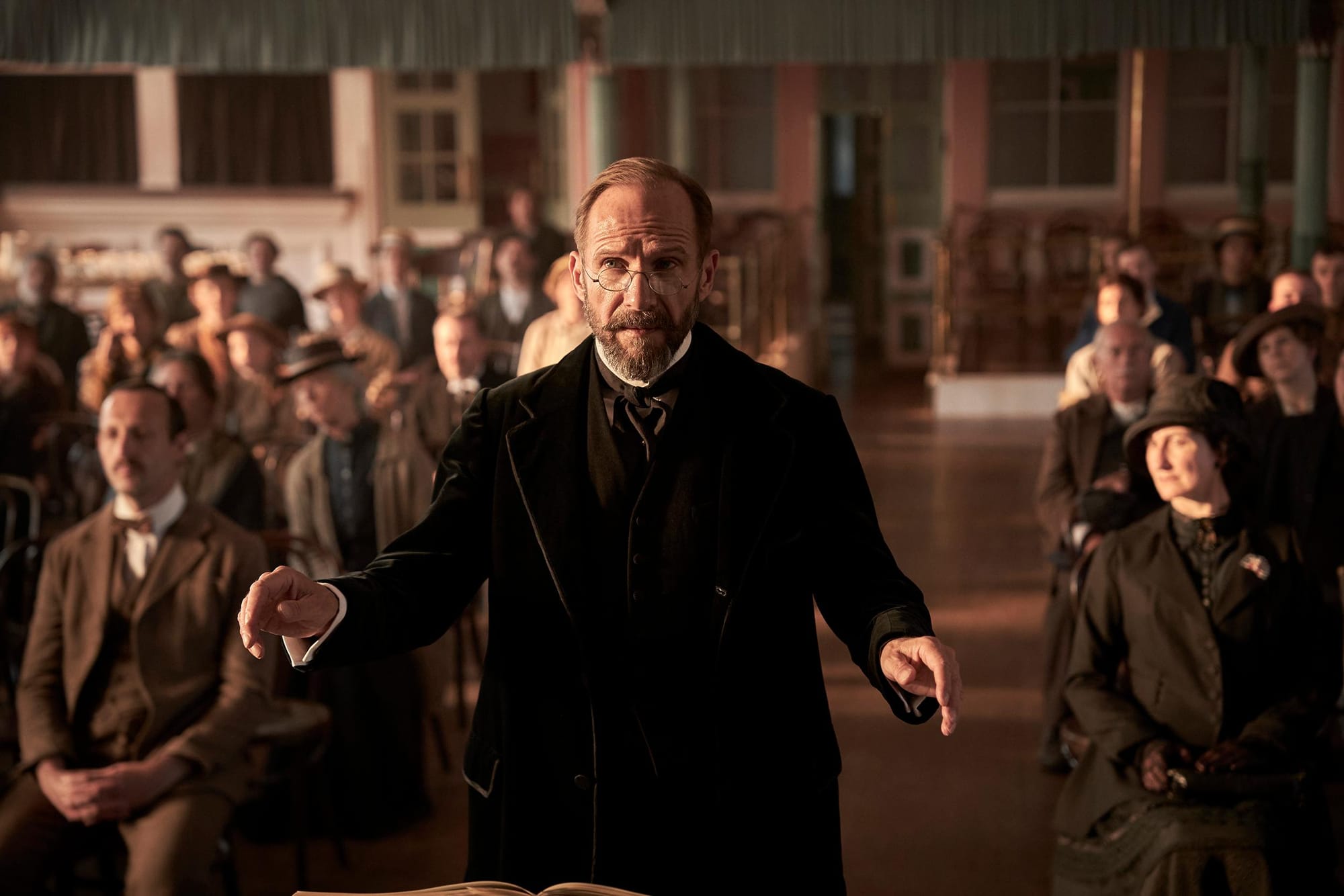A STRANGE REFRESHMENT

Spoilers ahead
Considering that British composer Sir Edward Elgar once conducted concerts for lunatics in a local asylum in Worcester, it seems unlikely he would kick up a fuss about a conductor, Dr. Guthrie, played by Ralph Fiennes, and his chocolate-box selection of singers in Nicholas Hytner’s new film The Choral, its release perhaps cynically timed to coincide with Remembrance weekend and Armistice Day.
And yet, Alan Bennett, that rich-tea biscuit of British playwrights, asks us to suppose that the composer would take umbrage at a stage-adapted and greatly reduced orchestration of his most famous religious work, The Dream of Gerontius, performed by a ragtag choral society in the north of England. Perhaps the moustached maestro might have, but it leaves a sour taste that the story’s third-act crisis needs this petulant “never meet your heroes” twist to help it along — to wring out an ending that feels completely unearned. It’s really not worthy of the deeper themes flowing beneath the comic veneer the film promises, and more importantly, not worthy of one of Elgar’s greatest works itself. Still, there is just about enough Sunday-afternoon charm to be found in the genteel depiction of small-town life in the fictional Ramsden, pitted against the wider frame of the First World War. Hytner and Bennett have enough experience between them to deliver something that comfortably sits alongside other nation-pacifying domestic comedies such as The Full Monty and Brassed Off.
On the subject of conductors, one wonders if Bennett had Sir Simon Rattle in mind when writing the character of the atheist, Germanophile Dr. Guthrie. Both men seem far less enamoured of their native country than of the Führer’s homeland — that land of Bach, Beethoven, and Brahms. Rattle, famously disgusted by the outcome of the Brexit referendum in 2016, decided a few years later to relieve us of his conducting mediocrity by moving to Germany to claim citizenship — ironic, given that he was once the darling of English music critics, who elevated his importance as a musician far beyond his talent. He was, I suppose, the Keir Starmer of classical music. The opinionated internet oracle of all things classical music, Dave Hurwitz — whom I recently waxed lyrical about in my DR post on favourite pod and vid casts — has been calling out the frizzy-haired charlatan and his underwhelming performances again lately, much to my petty amusement. But I digress.
At least the Goethe-quoting Dr. Guthrie concedes that, in Elgar, England possesses a true treasure — one that has earned the enduring respect of European (mostly German) audiences. I remember once attending a sublime performance of Elgar’s Second Symphony at the Royal Albert Hall, performed by the Berlin Staatskapelle, a legendary German orchestra, which was somewhat spoiled by a post-concert sermon delivered to the audience by the Argentinian conductor Daniel Barenboim — a sort of cringeworthy paean to globalist utopianism and a chastisement of nations seeking sovereign independence from broader political entanglements in the twenty-first century. Bumping into a well-known journalist after the concert, we joked that Elgar was practically German anyhow, having steeped himself in the works of Bach and Brahms. Culture travels far more swiftly than bad politics ever will.
Perhaps Guthrie is reconciled to choosing Elgar’s Gerontius over Bach’s St. Matthew Passion because of its Germanic qualities in parts — a compromise that avoids the thorny issue of German sympathy in the small English town that suits both parties: his and The Choral.
In the end, Fiennes’s Guthrie may seem perpetually disappointed in life and the unfolding geopolitical events of 1916, but never in the music, where he finds a certain kind of salve for his tormented soul. And though he’s a miserable and godless grump, at least in his recognition of Elgar’s masterwork Catholic oratorio, he finds his own way to offer “praise to the holiest” while the world — or more specifically, Europe — is fast headed to hell.
The Choral is currently showing in cinemas nationwide.